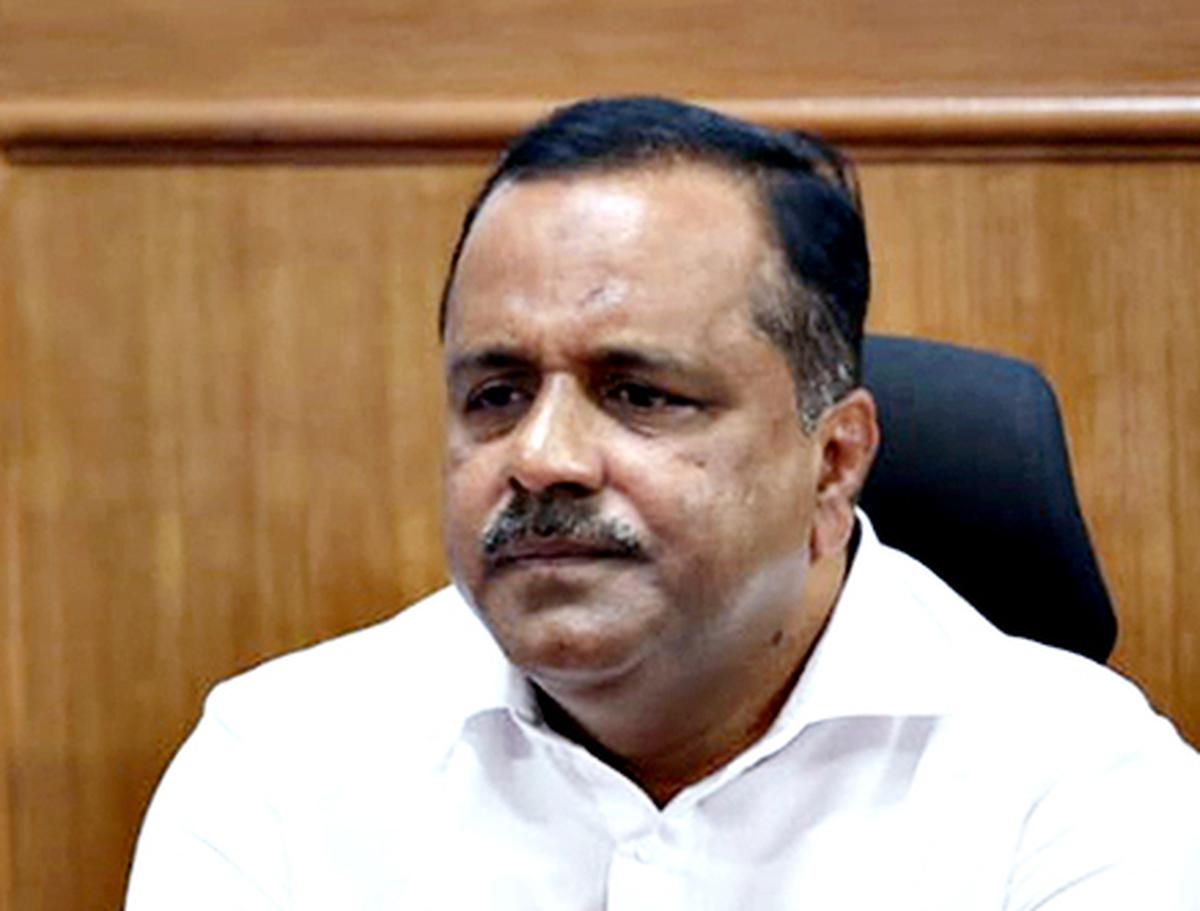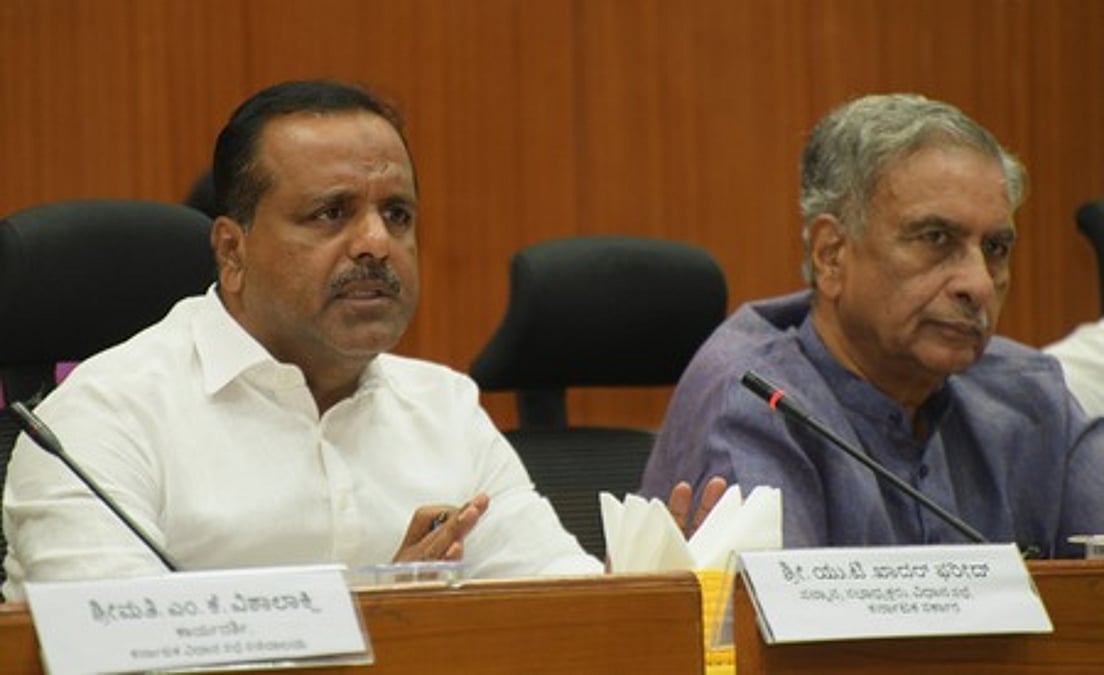Veteran politician and Legislative Council Chairman Basavaraj Horatti has written to the Speaker of the Karnataka Legislative Assembly, expressing deep displeasure over what he termed “unilateral decisions” impacting the functioning of the legislature. In his strongly worded letter, Horatti emphasized that such actions undermine the spirit of democratic deliberation and disrupt coordination between the Assembly and the Council. His intervention comes at a time when tensions between legislative bodies have been simmering, with critics pointing to growing friction in decision-making processes and the marginalization of institutional consensus.
Horatti’s concerns revolve around recent administrative and procedural decisions that, he claims, were taken without adequate consultation or discussion. According to him, the Speaker’s actions bypassed established norms of mutual cooperation between the two Houses. The letter underscored that effective governance requires not only political will but also respect for institutional processes that balance differing perspectives. Horatti’s statement has been widely interpreted as a defense of legislative autonomy, aiming to safeguard the Council’s relevance in Karnataka’s political landscape. His remarks have now sparked a larger debate over power-sharing within the state legislature.
The Speaker’s office has yet to issue a formal response, but officials close to him downplayed the allegations, stating that all decisions were made in the interest of efficiency. They insisted that due process was followed and that the measures were aimed at streamlining operations within the Assembly. Nevertheless, Horatti’s public airing of grievances has amplified existing political rivalries, with opposition leaders seizing the opportunity to question the ruling establishment’s commitment to democratic norms. Observers note that the controversy could escalate if not addressed with tact and dialogue.

Tensions Between Legislative Institutions
Horatti’s letter sheds light on the often-overlooked dynamics between the Legislative Assembly and the Legislative Council. While the Assembly wields greater power, the Council plays a vital role in reviewing and refining legislation. Analysts argue that unilateral actions by the Speaker risk diminishing the Council’s role, effectively sidelining the checks and balances inherent in a bicameral system. This could weaken deliberative democracy, leaving important voices unheard. By taking a firm stand, Horatti appears to be defending not only his office but also the institutional balance that ensures more comprehensive governance in Karnataka.
Horatti’s intervention has been seen as both timely and symbolic, given his stature as one of Karnataka’s most seasoned politicians. Having served in various roles over decades, he carries the weight of experience and authority. His letter reflects not just personal displeasure but also institutional concern, with many insiders suggesting that he speaks on behalf of others who feel sidelined. Within the legislature, whispers of discontent have grown louder in recent months, and Horatti’s open challenge to the Speaker is being viewed as a rare instance of dissent surfacing in the public domain.
Political analysts observe that the conflict between Horatti and the Speaker reflects a broader struggle within Karnataka’s governance framework. The Assembly, with its numerical strength and executive power, has historically overshadowed the Council. However, when decisions appear to sidestep consultation, it raises questions about whether bicameralism is being respected in practice. Some argue that Horatti’s letter is not merely a personal protest but a constitutional reminder that both Houses must function in harmony, honoring democratic traditions and ensuring checks and balances are upheld.
The opposition has quickly latched onto the issue, portraying Horatti’s grievance as evidence of high-handedness within the ruling coalition. Leaders across party lines have demanded that the Speaker address the matter transparently, warning that any erosion of the Council’s role would weaken democratic governance. Some opposition members have even suggested forming a committee to review decision-making processes, ensuring that no office bearer acts unilaterally. Such proposals highlight how individual disputes can snowball into larger political battles, influencing debates beyond the legislature itself.
Within the ruling coalition, the controversy has sparked unease. Senior leaders are said to be mediating privately, hoping to calm tensions between Horatti and the Speaker. While they acknowledge Horatti’s grievances, they are also wary of conceding too much ground, fearing it could embolden dissent within their ranks. The balancing act, therefore, involves addressing concerns without undermining the Speaker’s authority. Failure to resolve the issue amicably could lead to further strain within the coalition, complicating governance at a time when stability is crucial.

The matter has also sparked conversations about legislative decorum. Critics argue that airing such grievances through public letters reflects a breakdown of internal communication channels. Traditionally, disputes between presiding officers are resolved behind closed doors, away from public scrutiny. By making his displeasure known openly, Horatti has signaled both urgency and frustration. Supporters, however, argue that transparency is essential, and that silence in the face of unilateral decisions would only embolden undemocratic practices. This debate underscores the evolving expectations of political accountability in the state.
Civil society groups and constitutional experts have welcomed Horatti’s move as an assertion of institutional integrity. They argue that in a democracy, even presiding officers must be held accountable when decisions bypass established norms. The letter has sparked renewed calls for clearer guidelines on coordination between the Assembly and Council. Such measures, advocates suggest, would minimize conflicts and ensure smoother functioning of the legislature. For them, the controversy presents an opportunity to strengthen democratic practices, even if it arises from a moment of friction.
Media coverage of the dispute has amplified its significance, turning what might have been a procedural disagreement into a statewide talking point. Editorials and panel discussions have highlighted the tension as symptomatic of deeper issues in Karnataka’s political culture, where centralization of authority often sidelines deliberation. Commentators argue that Horatti’s warning should serve as a wake-up call, reminding leaders that public trust in institutions depends on fairness, inclusivity, and respect for procedure. The spotlight on this issue has ensured it will not fade quickly from public memory.
The controversy also raises questions about the future of Karnataka’s bicameral system. Critics of the Legislative Council have long argued for its abolition, claiming it duplicates the Assembly’s role without adding significant value. Horatti’s defense of the Council, therefore, takes on added weight, as it demonstrates the institution’s importance in checking unilateralism. By emphasizing the Council’s relevance, Horatti has effectively countered arguments for its redundancy, asserting that it serves as a vital safeguard against concentration of power.
For legislators themselves, the episode has been a reminder of the importance of unity and dialogue. Members of both Houses have expressed concern that escalating tensions between presiding officers could paralyze legislative work. There is growing recognition that institutional clashes ultimately hurt the people, as they slow down lawmaking and governance. Calls are growing for both the Speaker and Horatti to engage directly, setting aside differences in the interest of Karnataka’s citizens. The pressure to resolve the matter constructively is building from multiple quarters.
Awaiting Speaker’s Response Amid Rising Debate
The controversy has already stirred public and political circles, with calls for the Speaker to clarify his position and reaffirm his commitment to consensus-based functioning. If the issue escalates further, it may prompt intervention from senior leaders of the ruling coalition, who will likely seek to avoid prolonged institutional friction. For Horatti, the move signals both his displeasure and his determination to assert the Council’s dignity. As debates continue, the focus remains on whether this episode will pave the way for constructive dialogue or deepen existing rifts in Karnataka’s legislative machinery.

Ultimately, the letter reflects a clash between procedure and authority, tradition and expediency. Horatti’s stand highlights the fragile balance that sustains democratic institutions, where power must be exercised with consultation and humility. Whether the Speaker chooses to respond with dialogue or defensiveness will determine how this controversy evolves. For now, Karnataka finds itself witnessing a rare public dispute between two of its most important legislative figures, a moment that could either weaken trust in institutions or strengthen them through reform and reconciliation.
Some legal experts have noted that Horatti’s letter could open the door for judicial scrutiny if the matter escalates. If allegations of unilateralism translate into claims of procedural violations, the courts may be asked to interpret the scope of the Speaker’s powers. This possibility has stirred speculation about whether Karnataka’s judiciary will need to step in, as it has done in past disputes over legislative functioning. Such an intervention, while rare, would reflect the seriousness of the issue and potentially set precedents for legislative governance in the future.
Veteran politicians have drawn parallels between the current episode and earlier instances of friction between presiding officers. They recall how disputes in previous decades were often resolved quietly, with senior leaders stepping in as mediators. However, today’s environment of heightened media scrutiny and public debate means that controversies are less likely to remain behind closed doors. Horatti’s public stance, therefore, is being seen as a reflection of contemporary political culture, where transparency often outweighs traditional discretion in resolving internal disagreements.
At the grassroots level, the controversy has also sparked curiosity and debate among ordinary citizens. For many, the technicalities of legislative procedure may seem distant, but the principle of accountability resonates deeply. Citizens who already feel disconnected from political institutions see in Horatti’s stand a rare act of resistance against concentrated authority. By questioning unilateral decision-making, he has tapped into wider concerns about transparency and fairness in governance, themes that strike a chord with people across party affiliations and social backgrounds.
Looking ahead, much will depend on how the Speaker chooses to respond. A conciliatory approach that acknowledges Horatti’s concerns and commits to greater consultation could defuse tensions quickly. On the other hand, a dismissive or confrontational stance risks deepening the rift and triggering wider institutional unrest. Political observers note that the episode is as much about personal equations as it is about procedure, meaning tact and diplomacy will be essential in steering the legislature back toward stability. The coming weeks will reveal whether Karnataka’s leadership can rise to the challenge.
Follow: Karnataka Government
Also read: Home | Channel 6 Network – Latest News, Breaking Updates: Politics, Business, Tech & More

